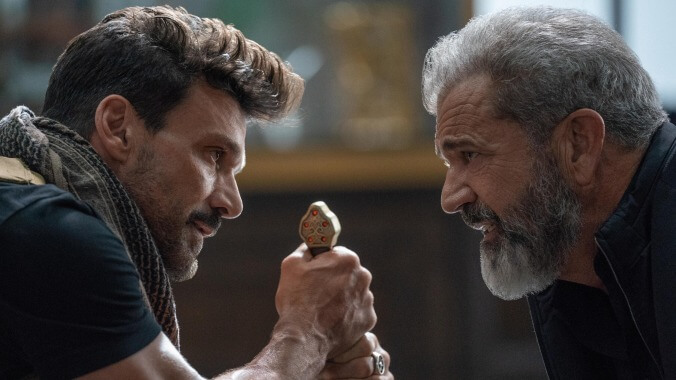The flamboyant, consistently unfunny liquidators and trigger-people recall Carnahan’s post-Tarantino ensemble hazing ritual Smokin’ Aces; the rest is even more derivative. Boss Level is hardly the first movie to imply similarities between a time loop and the life-death cycle of a player character—Edge Of Tomorrow turned it into a redemption arc. However, it is the first to have the hero tell us, at the beginning, that “It’s like being stuck in a video game.” Ironically, this has the opposite effect: All one can see under the flashing faux 8-bit letters is how this isn’t like a fun video game. It’s true that many of the classic coin-operated beat-’em-ups mentioned briefly in the film are grinds with nonsensical plots. Few of them, however, are about learning to be a dad.
Will our escapist fare ever stop telling us to put away childish things? Can one really accept life lessons from a film with multiple Hitler jokes? While Carnahan’s sense of humor has always been juvenile, in Stretch it at least benefitted from a gonzo factor and the crucial quality of having funny parts. Boss Level, however, is clumsy from the jump, with lame gags and a ceaseless, obtrusive voice-over that is always telling us why the next part is funny or what’s happening on screen (in case the viewer is distracted by their phone). The macabre comedy potential of watching Roy bite the dust ad nauseam is, if anything, underexplored; Carnahan can’t seem to think of anything more darkly comic than a guy taking a bullet to the groin. (As in the kitchen, it’s really all about timing and proportion. A man getting shot in the balls once isn’t funny—but what if it was 10 times?)
Somewhere in there is a basic but poorly organized plot. There’s a MacGuffin called the Osiris Spindle that’s obviously related to Roy’s super-secret scientist ex, Jemma (Naomi Watts, in a nothing role), and her cigar-smoking, megalomaniacal boss, Colonel Ventor (Mel Gibson, not given enough scenery to chew). How does the Osiris Spindle work? This isn’t really a question that warrants answering, but some quantum-gobbledygook exposition would definitely be preferable to the film’s emotional B-plot, which concerns Roy and Jemma’s 11-year-old son, Joe (Grillo’s real-life kid Rio Grillo), who knows Roy only as his mom’s old friend, not that he’s his biological father. The reader can probably guess where this is going: Roy’s got to make up for all the time he lost as a commitment-phobic ex-Delta Force global ass-kicker. “There are some things you can’t redo,” he tells us. Sure, bud. Slap that on a photo of a sunset and ’gram it.
The sentimentality is as rote as the movie’s ’80s lunchbox nostalgia, which offers up a Wilhelm scream, some entry-level Raiders Of The Lost Ark trivia, and a trip to an arcade tournament without the grating nerdy investment of, say, Ernest Cline. The fact is, the sheer number of recent movies and series, both good and bad, that have put characters in Phil Connors-esque predicaments (Happy Death Day, Palm Springs, Russian Doll, The Map Of Tiny Perfect Things, Before I Fall, etc., etc.) so they can develop a deeper appreciation for the consequences of their actions, find romance, or improve their combat skills does suggest a shortage of new ideas. Maybe it really is the perfect metaphor for our time: We’ve seen this movie before.

 Keep scrolling for more great stories.
Keep scrolling for more great stories.
